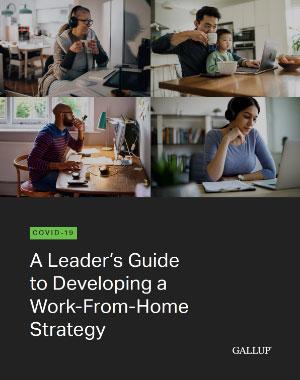Story Highlights
- Employees should lean into their talents when parenting
- Spotting children's strengths is a learned but valuable skill
- Managers are positioned to coach parents to focus on strengths
Since the outbreak of the coronavirus, the number of remote workers skyrocketed in some industries, and many of those employees have children at home. This has blurred the line between work and home for your employees, changing the nature of their relationships with their families.
Meanwhile, worry, stress and poor wellbeing are at a peak -- which, Gallup finds, can harm business outcomes -- so your managers have been trying to balance working parents' conflicting demands during a time of unprecedented emotional turmoil.
It's hard on managers. Hard on businesses and parents too. But the pressure can be reduced, and one of the best ways your managers can help working parents right now is to support employees the same way the best managers always do. Through the employees' strengths.
Parents should use their strengths at home, not just at work.
We're all born with certain innate capacities that filter the way we see the world and react to it. Gallup calls them CliftonStrengths, and intentionally using these natural patterns of thinking, feeling or behaving at work improves business outcomes. People who know and use their CliftonStrengths are more engaged at work, achieve higher sales, greater profitability, and have higher productivity, among other outcomes.
But our CliftonStrengths don't switch off when we leave work. They're always with us and can be used just as powerfully at home -- that's what Strengths-Based Parenting from Gallup Press was written to do: Help parents be their best selves with their families and bring out the best in their kids.
These extraordinary natural talents benefit families just as they do teams, and applying them to family situations can alleviate some of the stress your employees feel.
Unfortunately, people don't always look for ways to employ their strengths outside of work -- they may even think they're only useful in the grown-up world, not with kids. That's the wrong way to view strengths.
No matter the circumstance, properly used strengths are additive. Take Focus, a drive to stay on task and finish what you start. Parents who are exceptionally talented in the Focus theme can use that trait to help kids master skills, like shoe tying or essay writing -- especially when the going gets rough and giving up sounds good. Focus gets people to the finish line.
Or consider Communication, the traits of which include a capacity for making ideas exciting and vivid and for influencing the actions of others through words. At work, people with strong Communication can inspire people to action. At home, they can boost kids' enthusiasm and direct it toward a goal.
There's no such thing as the perfect parent.
But parents should also know they have weaknesses. Gallup scientists define weaknesses as a trait that gets in your way or that of others.
Sometimes we can manage our weaknesses by avoiding a situation, getting help, establishing reasonable expectations of ourselves and our kids, or defining what's really important to our families and concentrating on that.
Consider Focus again. It's difficult for those with that theme to quit in the middle of something, which can become a weakness if you let it. Managers can coach those with Focus to be very aware of their priorities -- for example, that people are always more important than projects -- to help parents who work from home cope with conflicting demands for their attention.
Communication has a downside, too: Those who can create whole worlds out of words have to be very diligent about listening. And no matter how well the parent communicates a plan, kids' enthusiasm can fade before the end goal is reached. Managers can remind working parents with Communication that, though their talent is powerfully influential, children's attention spans are short and their buy-in is necessary for success -- so parents may have to be intentional about seeking the child's opinion and may have to say the same thing over and over in different words to reach the outcome they want.
The important thing to remember, though, is that parents should honor who they are. And use their natural talents that help them succeed in the workplace at home as well. Their CliftonStrengths -- all of them, top to bottom -- are of great consequence.
And so are the strengths of their children.
Learn to spot and nurture budding strengths in children.
The function of childhood is to learn and grow -- to change. Nonetheless, a child's dominant strengths emerge at a very young age. Watch for clues to talent, and note when a child displays:
Yearnings: Activities or environments a child is repeatedly drawn to or eager to try.
Rapid learning: New skills or activities a child picks up quickly and easily.
Satisfaction: Activities a child is excited about doing again and again, that they find especially fulfilling.
Timelessness: Activities in which a child becomes so engrossed that they seem to lose track of time.
When parents spot those indicators, they know their child is operating in an area of strength. Understanding a strength as a strength gives parents deeper insights into a growing child. And it helps people accept -- maybe even admire -- the activities many parents don't approve of but must tolerate to get their work done during quarantine.
"My sons finish school before lunch, and then it's all Animal Crossing and social media until supper," says one mother who is working from home. She says it's far more screen time than they used to get, and she felt guilty and nervous about letting them have it -- there are well-known dangers associated with kids and the internet -- until she took an afternoon off, inserted herself in their activities, and talked to them about it.
That's when she realized their screen time is how they apply their strengths in quarantine.
"My younger son loves Animal Crossing because it allows him to set goals and rack up achievements, which suggests the CliftonStrengths Achiever theme to me," she says. "For my older son, social media is his whole social life. He's always needed a lot of social contact, which he used to get through sports and clubs."
This working mom says that regular screen rules will resume when school starts, and they can socialize with friends and "rack up achievements" as they did before. But for now, examining her sons' online activity through a strengths lens eased her anxiety and showed her a different side of her sons and their strengths.
The path to a child's greatness is paved with parents' questions.
But to get to the "why" behind her sons' activities, she had to take part in their pastimes, talk to her boys about their activities with interest and respect, and connect dots between what they do and who they are.
Doing so showed her more signs of talent than she expected to see.
Talking to children about the things they like best and like to do best is a gift to them. They like explaining things they care about to people who truly want to learn -- as do adults. Ask your CFO about tax strategies. But just as importantly, trying to see the world through a child's eyes dignifies and celebrates their natural abilities.
It shows parents the unique and marvelous individual the child is. Moreover, identifying a strength is the first step toward nurturing it to greatness.
And the value of that cannot be overestimated.
Dr. Adam Hickman, Gallup's Content Manager, is a father of three, one of whom, Elliana, showed developmental delays in early childhood. Dr. Hickman and his wife follow the directives of cognitive experts, but they very deliberately decided their focus would be on Elliana's strengths -- her ability to learn quickly once she emotionally connects with a friend or teacher, her astute perception of others, her innate sunny nature -- not the percentile difference between her and the average child.
"I am convinced that had we spent the last eight years of her life consumed with what isn't natural for her and where perhaps she falls behind other children her age when you study the 'percentiles,'" Dr. Hickman says, "Ellie would be a completely different little girl."
The important thing -- and it is extremely important -- is this: parents can nurture but can't change a child's strengths.
Parents can direct kids and should, but it's like dropping a rock into a stream: the rock may change the stream's direction, but it's still the same water. Moms and dads can alter the course but not the kid, and coaching children toward the best they have in them directs them toward their greatest potential.
Maybe managers can't fix the problems in employees' lives, but a little parental support can go a long way.
Coaching employees' strengths toward their best is where your company finds its greatest potential. But there's a big difference between companies and families.
Organizational results are evaluated by objective metrics: increased revenue, more organic growth, higher productivity, innovation, customer engagement. Family results are evaluated by subjective feelings: hope, growth, compassion, love.
And right now, as your employees juggle being a parent, a teacher, and a professional in a tough economy, their subjective feelings may also include stress, worry, and poor wellbeing.
Your managers can't salve the emotional wounds or solve the economic problems that the pandemic created. But they can remind their people to do what they do best at work and at home.
It can be a surprisingly helpful and deeply compassionate gesture. It can help your organization's families through a very difficult time. And -- considering the impact of strengths on performance -- it can create a more resilient, less stressed workforce in your organization, too.
It's not only the right thing to do. It's the smart thing to do. Bring CliftonStrengths to your company:
- Learn more about Gallup's CliftonStrengths approach to talent development.
- Discover what happens when employees begin to develop their strengths. Download Gallup's Strengths Meta-Analysis Report.
- Subscribe to our CliftonStrengths newsletter. Sign up to get our best strengths-based development content delivered to your inbox.





